| Official Name: | Dominican Republic |
| Official Language: | Spanish |
| Area: | 48,442 km2 (10,710 sq mi) |
| Population: | 11,088,650 |
| Time Zone: | UTC−4 |
| Capital City: | Santo Domingo |
| Elevation (Santo Domingo): | 14 m (46 ft) |
| Currency: | Dominican peso (DOP) |
| Main Cities: | Santo Domingo, Santiago de los Caballeros, San Francisco de Macorís |
| Main Port: | Port of Santo Domingo |
| Required visa for entry: | Nationals from Canada, EU countries, and the UK and others DO NOT require visas, other than paying USD upon entry. Click here for more information concerning visa requirements. |
| Required vaccination for entry: | None |
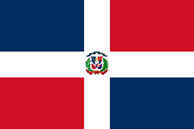
Main Risks:
Theft, robbery, extortion, rape, fraud, vehicle assault.
Executive Summary
The Dominican Republic features medium risks. Security risks increase considerably in impoverished neighborhoods, particularly removed from central and commercial areas. Low and medium level opportunistic crime is the main threat to foreign visitors. We recommend procuring secure transportation services for business trips. For high-profile trips, we recommend hiring executive protection services.
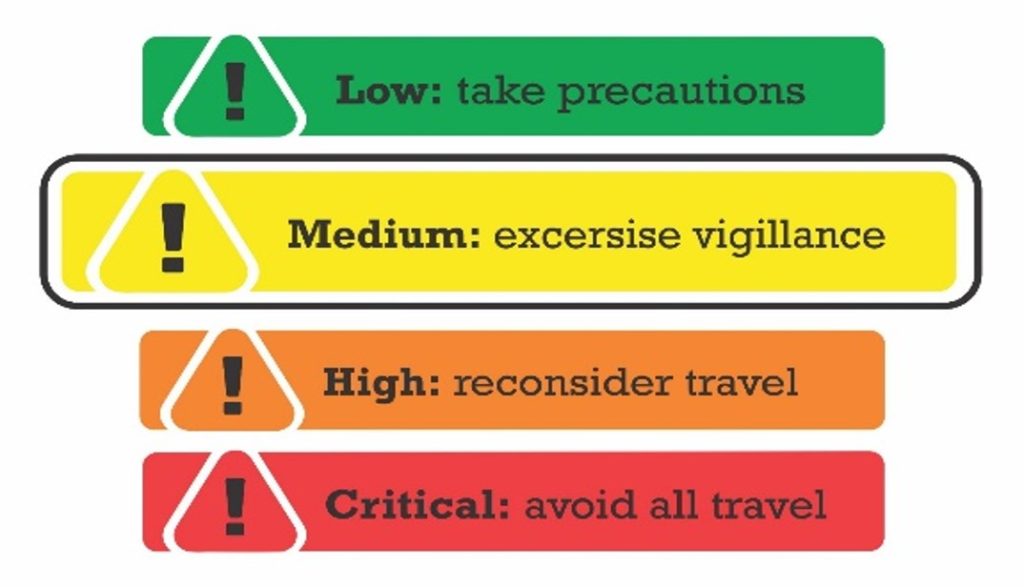
General Risk Level: MEDIUM.
The risk is stable throughout the country. It is not advised to travel through the countryside using public transportation or to deviate from relatively safe areas. For security reasons, it is not advised to approach the border area with Haiti.
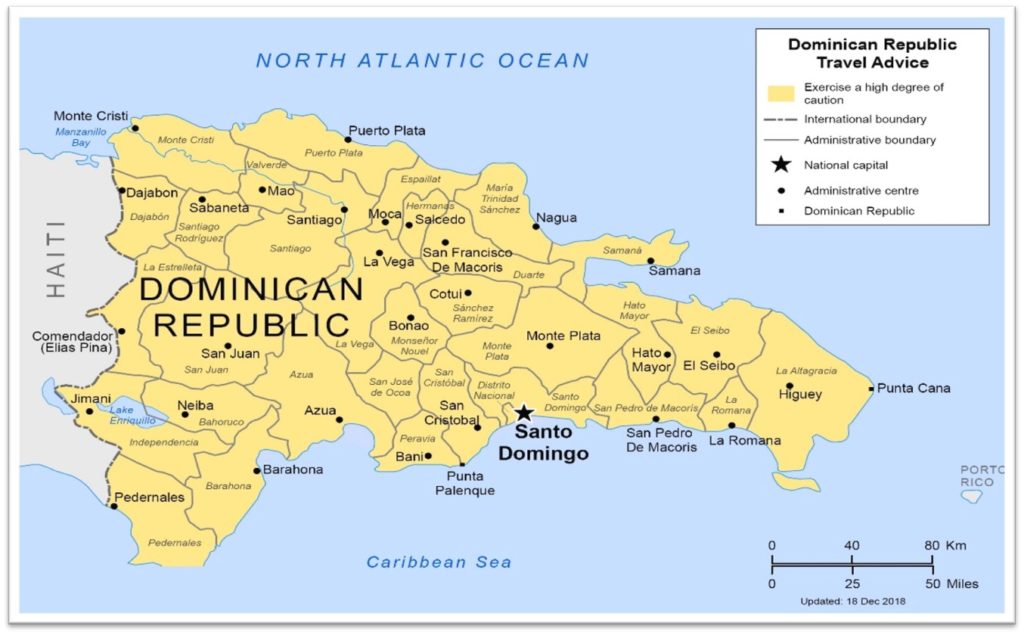
Crime and Security
Low and medium-level crime is the main threat to those visiting the country, especially outside central and relatively safe neighborhoods and beachside areas. That said, even privileged sites are vulnerable to witnessing violent crimes. A commonplace modus operandi involves opportunistic assault with motorbikes, which criminals use to hit and run after committing an offense. On top of failing police control and presence, firearms are widely available among criminals. As a rule of thumb, armed assaults are more likely to take place during dark hours. Nonetheless, these episodes are also liable to transpire during the day. Criminals furthermore capitalize on traffic jams to assault vehicles at a standstill.
Organized crime in the country is involved in drug trafficking and money laundering. However, these activities do not directly pose a physical threat to foreigners visiting the country. In any case, please consider that local police lack resources and are not deemed as sufficiently trained to cope with challenges posed by crime. For this reason, we advise procuring private transportation services before traveling to the country, especially in the event of business agendas. As a precaution, for high-profile trips, we also recommended hiring executive protection services.
Protests in Santo Domingo can lead to vehicular disruptions and lead to localized scuffles between activists and police. Protests are usually related to lacking infrastructure and deficient public services. For security reasons, travelers are advised to refrain from approaching the vicinity of any unfolding political demonstration.
Finally, please bear in mind that the Dominican Republic has a storm and hurricane season between June and November. Adverse weather can lead to security risks, especially in seaside areas, and may lead to travel disruptions and deficiencies in basic services.
Security in Santo Domingo
The risk in Santo Domingo varies according to the area in the city. As a rule of thumb, the risk increases considerably in the northeastern and northwestern parts of the city. Moreover, although central parts are relatively safe, it is necessary to exercise caution and vigilance in the Colonial Zone (Zona Colonial). The safest neighborhoods are those generally housing the middle and upper classes, as well as foreign and business interests in the country. Convenient areas for lodging, travel, and conducting business and transactions are Los Cacicazgos, Bella Vista, and the areas running adjacent to Anaconda Avenue. It is also feasible to lodge in the San Gerónimo area next to the shoreline, the Piantini commercial district, and the residential zones in the north like Los Jardines and Arroyo Hondo. These areas are perceptibly safer because they are better protected by security forces and private security agents. That said, please bear in mind that even relatively safe areas can witness acts of crime and violence.
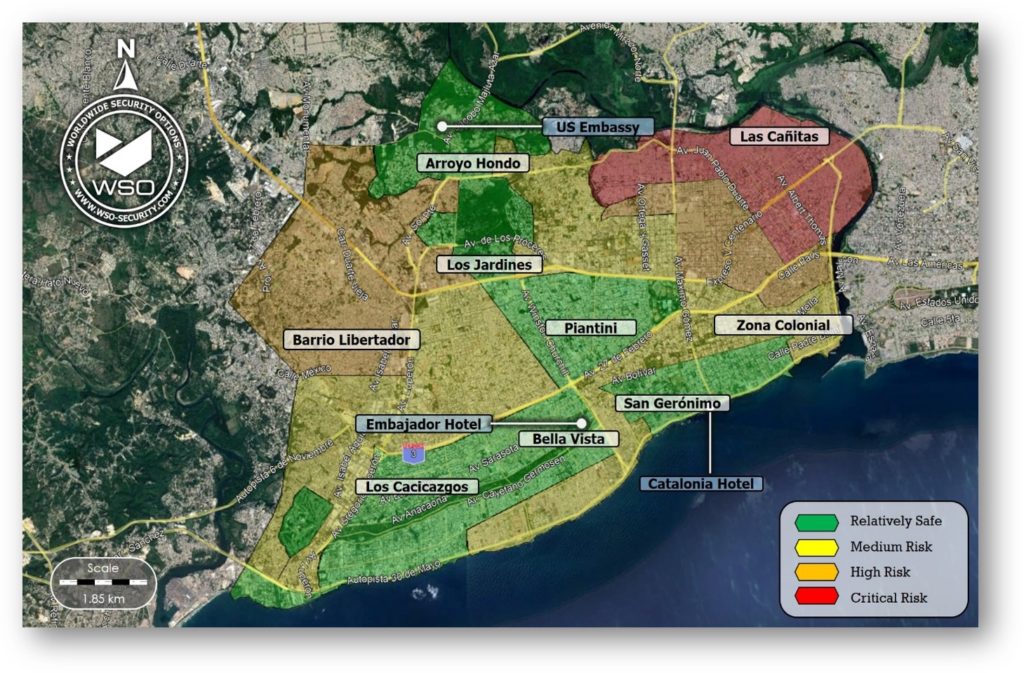
Las Americas International Airport (STD) is the most important international entry point into the country. It is located east of Santo Domingo. The journey between the airport and the Piantini business district takes approximately 30 minutes depending on traffic. Bear in mind that the journey involves passing through high-risk areas, so it is preferable to avoid traveling during dark hours.
La Isabela International Airport (JBQ) is located north of Santo Domingo, in the community of Higüero. The airport servers domestic and Caribbean flights. The journey between the airport and Piantini also takes approximately 30 minutes.
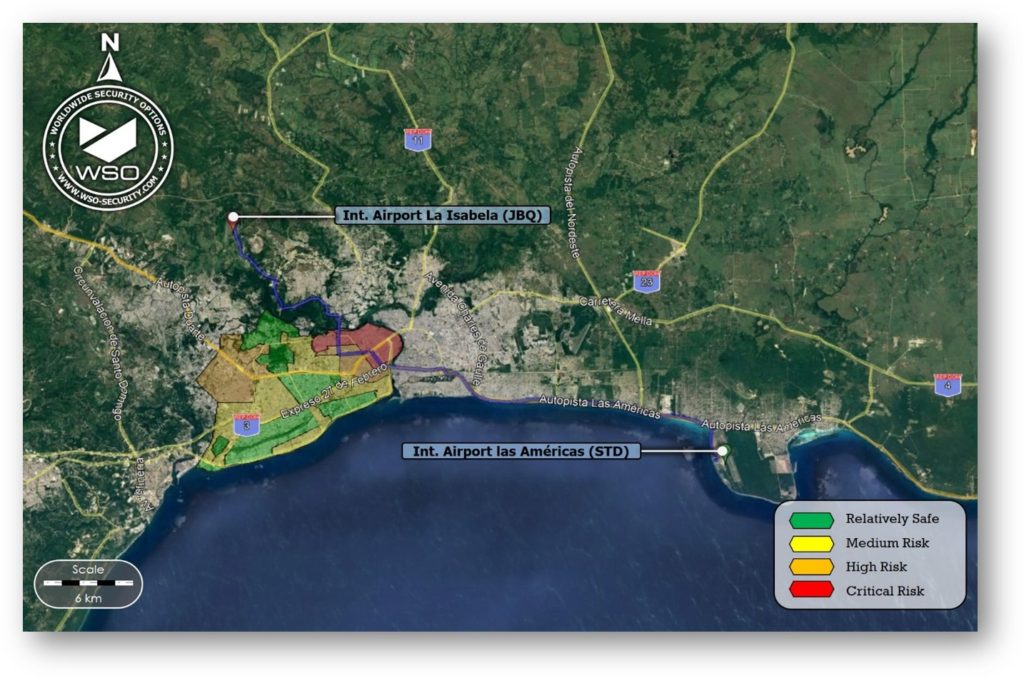
Transportation
For security reasons, we recommend avoiding public transportation services in the Dominican Republic. It is feasible to use private taxis recommended by the main hotels or to use ride-sharing apps. For business trips, it is always preferable and safest to resort to reputable private transportation services. For high-profile trips, we recommend hiring executive protection services as well.
Land routes in the countryside are not always in good condition. Traveling through them can entail security risks, especially if traveling by night or under conditions of poor visibility. If the itinerary in the Dominican Republic involves travel to locales outside Santo Domingo, it is paramount to plan the route in advance under the supervision of local security professionals. Educated assessments should enable the security contractor to determine the safest route and avoid unilluminated or otherwise dangerous paths.
Health and Sanitary Conditions
The Dominical Republic is vulnerable to tropical storms. Travelers should pay attention to meteorological conditions and avoid touristic trips during the hurricane and rainy season.
It is recommended to vaccinate against yellow fever, tetanus, hepatitis A and B, and typhoid before traveling to the country. Taking into account the tropical weather, it is very important to wear protection against bugs and avoid leaving body areas uncovered to mitigate the risk of suffering insect and mosquito-borne diseases such as dengue, Chagas, and the Zika virus. The quality of tap water in the capital is good but the same is not necessarily the case in remote localities. If in doubt, it is safest to drink sealed tap water.
It is not advised to travel without international health insurance covering emergency medical evacuation to the country of origin.
Take essential health precautions to mitigate the risk of contracting diseases or viruses. Carry masks in crowded places such as airports and maintain rules of social distance and avoid contact with surfaces of common use in public places. Always carry hand sanitizer.
Tactical Recommendations
Exercise vigilance and situational awareness throughout the trip to the Dominican Republic. In Santo Domingo avoid non-essential travel to high and critical-risk areas.
For business trips, we recommend procuring secure transportation services. In the case of high-profile visits, we further recommend hiring executive protection services. In any event, we advise against using public transportation in the country.
Avoid carrying large sums of cash or valuables during the trip. We advise against wearing or carrying items in public that may give the impression of economic affluence and which could attract unwanted attention from criminals.
Avoid traveling through the country in sport or luxurious cars which could attract unwanted attention from criminals and corrupt police officers.
Do not resist armed robbery attempts. We recommend to always carry a few 1000 (DOP) or 20 USD bills for duress cases, specifically to appease criminals looking for easy money.
For security reasons avoid travel during night hours outside relatively safe areas.
We recommend lodging in reputable establishments and hotels with private security. In Santo Domingo, it is best to stay in Cacicazgos, Bella Vista, San Gerónimo, or Piantini.
As a precaution, avoid the vicinity of every kind of political demonstration or rally in urban areas. Peaceful demonstrations are liable to be infiltrated by violent elements.
Take all necessary precautions to mitigate the risk posed by insect and mosquito-borne diseases. When visiting remote locations drink sealed bottles if the quality of tap water is questionable. Do not travel without medical insurance covering emergency medical evacuation to the country of origin.
Emergency Contacts
Police: 911 (112 from mobile phones)
Ambulance: 911 (112 from mobile phones)
Fire: 911 (112 from mobile phones)
WSO Global Command Center: +1 956 467 4858 / gcc@wso-security.com
Security advice and assistance over WhatsApp: +593 99 461 1128 / +521 81 1511 3166







